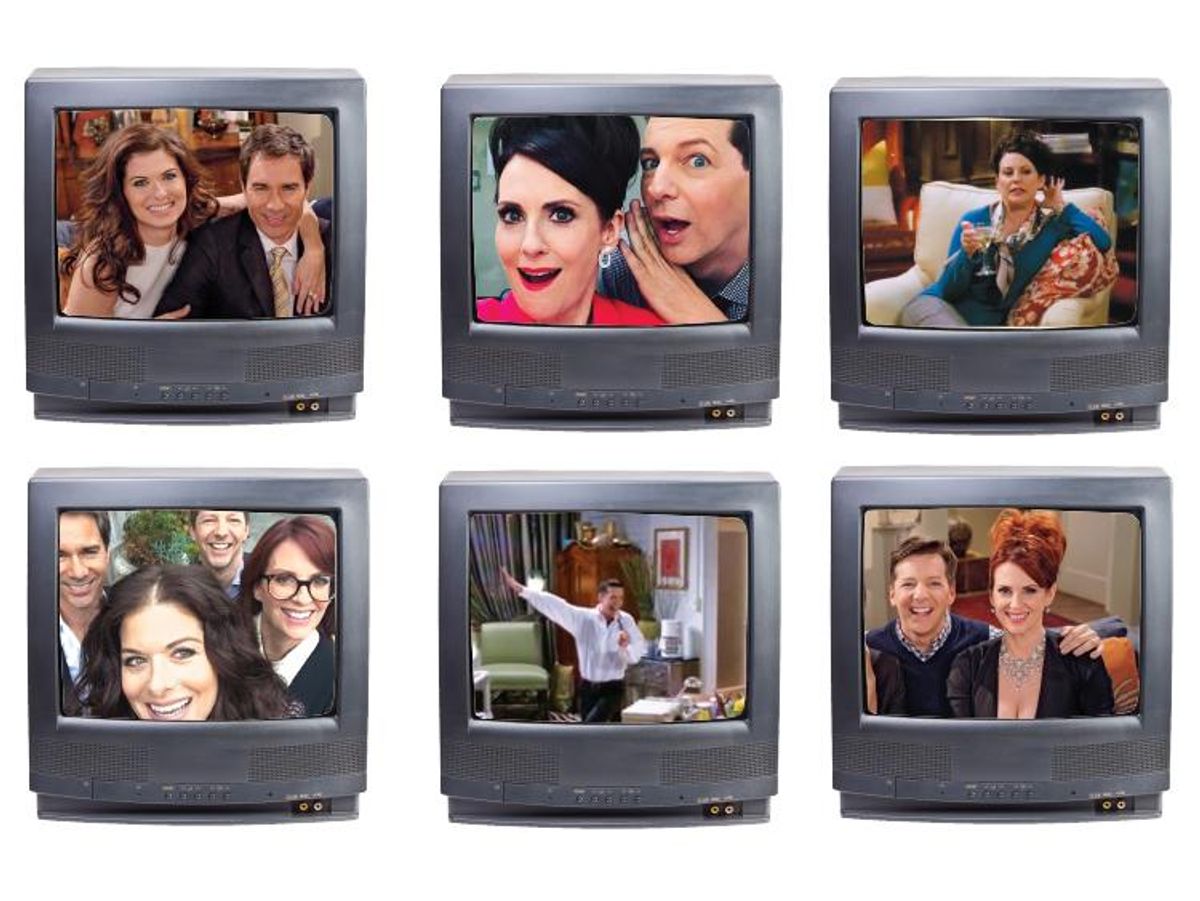Voracious queens across this soon-to-be-great-again nation were titillated at the prospect of a revival of Will & Grace, the much-loved sitcom that was groundbreaking for having two gay men as regular characters, one of them as the lead. In a post-Glee, post-Looking, post-Titus Andromedon world, that doesn't seem like such a big deal, but when Will & Grace premiered in 1998, it was huge.
Ellen had been canceled a year earlier, following a decline in the show's popularity after the titular heroine came out as a lesbian. The timing for Will & Grace was perfect then, and it's perfect now. Not only are television reboots all the rage (from The X-Files to Gilmore Girls and, less successfully, Fuller House), but the rights and freedoms of the LGBTQ community -- which Will & Grace, in its own small way, helped advance--are under threat by a conservative administration ripe for parody and ridicule. It's like the Bush years all over again. But Will & Grace isn't entering a completely unchanged television, or socio-political, landscape.
From Modern Family to Empire, LGBT characters are appearing on major networks. Marriage equality is, at least for now, the law of the land. Transgender people refuse to be walking punch lines and have organized into a visible community fighting tirelessly for their rights. Just as the LGBTQ community has evolved, so, too, must Will & Grace. Some of the jokes that flew back in the early '00s--particularly the ones relying on hackneyed gay stereotypes, like "Just Jack" jazz hands--won't fly in 2017. But that's not to say that the show should lose any of its bite. Myth, legend, and noted rumor Karen Walker was the gin-soaked, pill-popping vehicle through which the show delivered its most acerbic assault on political correctness. "How dare you call me a racist!" she once screeched. "A homophobe? Maybe. Distrustful of Spaniards? Who isn't?! But nobody calls me a racist. And you can ask anyone I own."
It would be sacrilegious to tone down Karen's boorishness--and it would drain about 50% of the laughs out of the show. The election special back in September, which set this whole reunion in motion, did a good job of realizing Karen's potential in a post-Trump America. Nearly 20 years later, Karen is a close friend of the Trumps, weekending in Mar-a-Lago with Donald and Melania. When Will accuses Trump of doing nothing but name-calling, Karen turns to Grace in shock and disbelief: "Did you hear what your pussy, gay, Muslim boyfriend just said?" Given that Trump impersonator extraordinaire Alec Baldwin is no stranger to the Will & Grace set, the possibilities are endless.
Karen and, to a lesser extent, Jack get a pass to be crude and insensitive because their outlandishness precludes any real animosity. Even Karen's ethnically insensitive insults to her maid Rosario come from a place of twisted love. Will and Grace, on the other hand, risk sounding genuinely mean if they practice the same behavior, because they are the show's heart and, as much as there is one, its moral center. Their morals, however, are ambiguous at best. Some of Will and Grace's funniest moments come from their attempts to disguise how awful they are, only to give up and give in to their darker urges--Grace's selfishness, Will's vanity, their obsessive codependence. They have always been less concerned with being good people than with being popular. Remember when they lied to Sandy Bernhard about wanting to buy her apartment just so they could be friends with her? That's who Will and Grace are: the embodiment of the "out of touch," ultra-PC, liberal elite; the most asleep "woke" folks in the room. Theirs would be the voices of reason, but a reason that lacks the basic understanding of how the world works.
Jack, who's the most embedded in queer life, deserves the biggest character growth. At the show's inception, Jack was dismissed by critics as a gay stereotype, but his pride and enjoyment in being gay set him apart from every other character on TV. Over time, Jack's cartoonish flamboyance became a fun way to play with cliches--like his love of Cher turning into literal worship when the diva played Jack's vision of God. An older, slightly wiser Jack would replace his distaste for lesbians with a zeal to unify the LGBTQ community that, Jack being Jack, would ultimately prove self-serving. Meanwhile, benevolent bae and Canadian prime minister Justin Trudeau should give Kevin Bacon a run for the object of Jack's stalkerish affections.
When a great sitcom works, it's like ballet, all the parts moving gracefully and seamlessly together: It's a dance of expert timing, dexterous slapstick, and razor-sharp writing; it's a Bea Arthur glare, it's Dick Van Dyke tripping over the ottoman, it's the water bra. Will & Grace was one of the last great, balletic sitcoms, so it would be a pleasure to just watch the old gang strap on their toe shoes and go through the movements. It's not as if, with eight seasons and 16 Emmys in the bag, they have anything to prove. And they ended that impressive run with one of the tidiest and most satisfying series finales in recent memory--too tidy and too satisfying. When last we left the fab four, they had jumped 20 years into the future, fully entrenched in their best lives. It'll be interesting to see how, if at all, the show addresses this, but it also poses the question: Why come back?
In a more overtly queer world, Will & Grace can go further and say more than it ever could before--in fact, it needs to. For years, Will never had a sex life. In the final seasons, he was rushed into a few relationships, most notably with hot cop Vince (Bobby Cannavale). In contrast, Jack was ludicrously promiscuous, but it was all talk and little action. The most important thing Will & Grace could and should do is let Will and Jack be really, fully gay--the kissing, holding-hands, cuddling-with-a-significant-other kind of gay--without making a joke of it.
(Video) Debra Messing on NBC's Revival of Will & Grace:
Like what you see here? Subscribe and be the first to receive the latest issue of Out. Subscribe to print here and receive a complimentary digital subscription.


























































































Cooper Koch and twin bro spark controversy with eye-popping 'White Lotus' parody